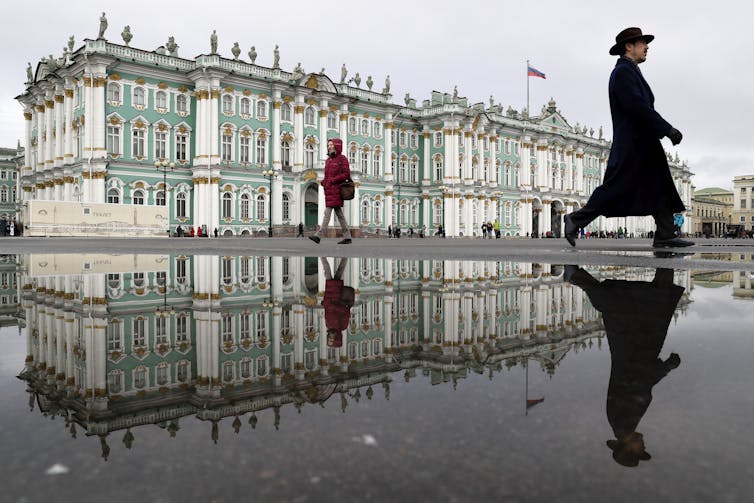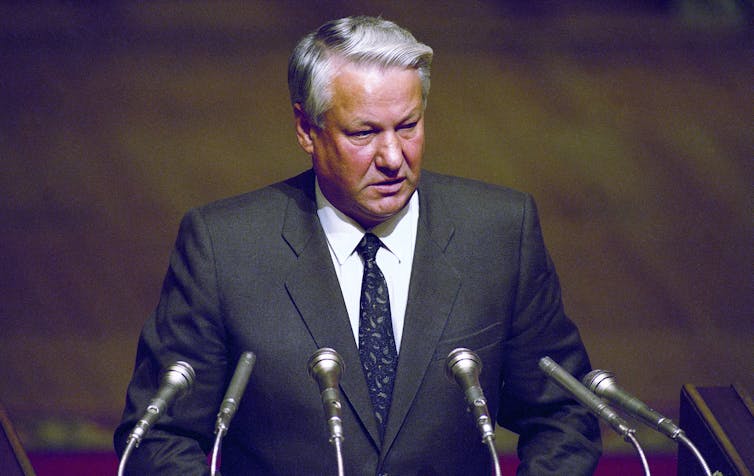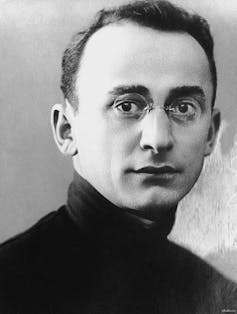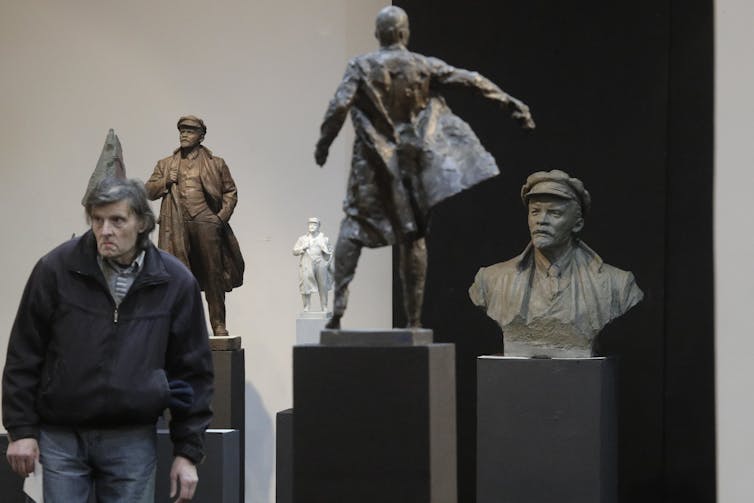| MercatorNet |November 8, 2017| MercatorNet |


How does an authoritarian regime celebrate a revolution?
All should be subsumed within an overarching narrative of Russian glory.

A worker cleans a statue of Vladimir Lenin in St. Petersburg. Dmitri Lovetsky/AP Photo
“And what, exactly, is there to be celebrating?” snapped Vladimir Putin’s press secretary on Oct. 25, a little more than a week before the 100th anniversary of what, in Soviet times, was lauded as the country’s greatest victory.
On Nov. 7, 1917, Vladimir Lenin seized power in St. Petersburg. Soviet authorities glorified that day as the dawn of the world’s first successful communist revolution – and the creation of the first country to promise racial, gender and even economic equality.
In 1967, to honor the Soviet Union’s first half-century, leaders staged countrywide displays of mass jubilation. They ordered sausages be made with the number “50,” in white fat, running through every slice.
But today, though Lenin still remains embalmed and on show in a giant mausoleum in Red Square, Moscow is strangely silent. Putin – whose grandfather cooked for Lenin – has simply called the event “ambiguous.”
Why this official disinterest, even as the centennial generates global headlines?
Perhaps because if you wish to project an image of a strong state and united people, then it’s awkward to toast the overturning of a seated government and beginning of civil war. All the more when Bolshevik actions in 1917 can be compared to those of Euromaidan protestors in 2014 Ukraine, who ousted a pro-Russian president in a move the Kremlin condemned as “an anti-constitutional takeover and armed seizure of power.”
While he’s capable of acknowledging the complexity of the Soviet origin story, Putin apparently sees no need to broadcast such confusion. Instead, he promotes an idea of “Russian greatness” in which history is used selectively, not to inform as much as to inspire. The Russian Revolution, however politically inconvenient, is no exception.
A popular uprising in name only?
In the Soviet era, the tricky thing about Revolution Day was that it was a holiday celebrating an uprising of the masses that didn’t, in fact, actually happen.
On that day, Lenin’s followers stormed into all of two buildings in the capital city of the Russian Empire. Occupying only the Winter Palace and the Central Telegraph Office, they proclaimed a government in the name of the people.
Exactly how the Bolsheviks managed to go from controlling two buildings to taking over an empire that spanned one-sixth of the world is, admittedly, quite a story. But there’s no getting around the fact that the initial, much-exalted Soviet “revolutionary moment” was little more than a coup. It was conducted by a ragtag group of political extremists who understood, at the time, that they were emphatically not acting with the support – or awareness – of most Russian citizens.

But if the Soviets struggled to recast Nov. 7 as a day when the poor turned against their rich oppressors, Russia, 100 years later, now has to grapple with the fact that it’s a capitalist country, a place where, according to Credit Suisse, 111 people control almost 20 percent of the country’s wealth. It’s also a nation that’s been ruled for 17 years by the same man – one who’s about to declare his candidacy for what would be a fourth presidential term.
At a time when Putin is keeping a tight lid on any potential opposition, the last thing the Kremlin wants to do is condone the violent overthrow of an oppressive, undemocratic regime.
Filling a symbolic void
Most pressing is the desire to project state power and national pride.
These aims were already evident in 2005, when Putin canceled the Nov. 7 holiday altogether and replaced it with a Nov. 4 “National Unity Day.”
To the extent that the Kremlin is acknowledging the upcoming centennial at all, it is with this theme of solidarity in mind. On Oct. 26, the Russian Ministry of Foreign Affairs tweeted that it will host an international conference titled “100 Years of the Russian Revolution: Unity for the Future.” The message of the event is clear: Focus on achievements to come rather than past conflict.
It’s not that Putin or his people are anti-Soviet. Putin, in his own memoir, has unapologetically cast himself as a patriot, eager to serve in the KGB and incensed when the Berlin Wall was allowed to come down in 1989. He has called the disintegration of the USSR a “geopolitical catastrophe.”
Above all, he has been deeply critical of the Yeltsin era and the early years of Russia’s transition from communism to capitalism. During this period of mass economic hardship, Russia’s natural resources were auctioned off for laughably small sums.

The collapse of the Soviet Union also left a huge symbolic void. Faced with a history of submission – first to ruthless and opulent tsars, and then to ruthless and slightly less-opulent Soviet dictators – Russians found themselves with little to be proud of.
Everything is great
Putin and his people changed that, but largely by cherry-picking their way through the past.
For the president, the Soviet era wasn’t about repression. Nor was it about the upending of traditional order. Instead, he portrays it as a giant modernization project, marked by the defeat of Nazi Germany, the launching of the first satellite into space, and advances in education and industry.
But in contemporary Russia, the aristocratic era that the Bolsheviks swept away isn’t depicted as all that bad, either.
Recent films of the period tend to ignore the fact that, in 1917, at least 80 percent of the population were abjectly poor peasants laboring in a country that possessed only 165 tractors. (At the time, 85,000 were operating in U.S. fields.) Instead, such dramas celebrate the beauty, broad spirit, sense of honor and daring of the Russian aristocracy (including the ability of great men to absorb prodigious amounts of alcohol).
The horrific violence involved in transforming this imperial empire into a Union of Soviet Socialist Republics tends to be glossed over.
Take, for example, the opening ceremony of the 2014 Winter Olympics in Sochi. There, dancers telling a story of Russian history needed only a brief interlude of darkness and snow to move from a ballroom waltz – a nod to a famous scene in Leo Tolstoy’s novel “War and Peace,” which celebrates the country’s defeat of Napoleon – to an acrobatic march amid giant pieces of machinery.
In the blink of an eye, glamorous aristocrats defending their empire from invasion morphed into smiling proletarians carrying ladders and building up their country.
A right and a wrong way to do history
Such “happy stories” can be sustained only by discouraging critical examination.
Soviet censors used to argue that open discussion of past wrongdoing could serve only to demoralize the people, tarnish their achievements and weaken the regime. Kremlin pronouncements today remain in line with such principles.

Here it’s worth remembering that Putin comes out of the same security milieu as did Lavrenti Beria, a notorious leader of Stalin’s secret police and a lifelong proponent of doing whatever it takes to promote state power. After Stalin’s death, Beria warned his fellow Politburo membersagainst any public critique of the great leader.
He scorned Nikita Khrushchev’s ideas of reexamining the cases of political prisoners serving time in labor camps and setting free those found to have been unjustly condemned. Release prisoners early for economic reasons, he argued, but never, ever admit the government made a mistake.
Beria lost the succession struggle, only to be unjustly condemned and shot as a spy. But his ideas live on.
This year the Kremlin did not participate in local services commemorating the anniversaries of two hostage tragedies and a nuclear submarine accident that took place during Putin’s presidency. All three incidents involved controversial government responses that the Kremlin has never acknowledged as flawed. In April, Moscow officials angrily rejected a finding by the European Court of Human Rights that Russia had been guilty of “serious failings” in its handling of one – a shootout at an elementary school in Beslan, in which 330 people were killed.
This strategy of denial extends into the cultural sphere. For example, a new British film, “Death of Stalin,” hasn’t yet been licensed for screening in Russia – but it’s already received blisteringreviews in the Russian press. Various sources have deemed the political satire “more like a circus performance of clowns than a movie,” a “provocation” and “a new form of psychological warfare.”
In contrast, the minister of culture recently extolled an upcoming, domestically produced movie called “To See Stalin,” about the man who designed the Soviet T-34 tanks in WWII. He called it “a great example of correct Russian film.”
Coverage of the revolution in state-sponsored media outlets similarly tends to downplay any unsavory aspects. Rather than focus on class conflict and coup, programs highlight the admirable qualities of the various the Russian leaders involved: Leon Trotsky, Lenin and even the last Russian tsar, Nicholas II. They aim to make citizens feel proud of their past, however problematic that past might be.

As Putin remarked last December in regard to 1917: “It is not permissible to drag the schisms, animosity, insults, and callousness of the past into our contemporary life.”
The Soviet-era politician Leonid Brezhnev was less circumspect.
Rejecting a poet’s appeal for permission to publish a diary recounting the terrors of Nazi invasion, Brezhnev proclaimed: “The main truth is that we won. All other truths fade before it.”
That is the message the Kremlin sends today. The mistakes, abuses, and countless individual tragedies of history should not drag the country down.
Cynthia Hooper, Associate Professor of History, College of the Holy Cross
This article was originally published on The Conversation. Read the original article.

November 8, 2017
Between the opioid crisis in America and euthanasia in Belgium things are looking pretty bleak today. But there are important things to note about them both.
If there’s a push for euthanasia where you live, and claims about how well it’s going in Belgium, just point the propagandists to Michael Cook’s review of recent developments there; even the main cheerleader for lethal injections is worried about the number of psychiatric patients being dispatched.
Or if people are worried about drug abuse, the Family Studies article by Kay Hymowitz on who is most vulnerable to opioid addiction and death in America highlights issues that any government, anywhere should be addressing. Family breakdown for a start.
Also: Harley Sims reviews a new novel by neo-pagan mythmaker Phillip Pullman; Barbara Lilley worries about the boys; and Mathew Otieno suggests that Rwanda is not such a great place for women after all. Finally, there’s fascinating new evidence about the difference between men and women.
If there’s a push for euthanasia where you live, and claims about how well it’s going in Belgium, just point the propagandists to Michael Cook’s review of recent developments there; even the main cheerleader for lethal injections is worried about the number of psychiatric patients being dispatched.
Or if people are worried about drug abuse, the Family Studies article by Kay Hymowitz on who is most vulnerable to opioid addiction and death in America highlights issues that any government, anywhere should be addressing. Family breakdown for a start.
Also: Harley Sims reviews a new novel by neo-pagan mythmaker Phillip Pullman; Barbara Lilley worries about the boys; and Mathew Otieno suggests that Rwanda is not such a great place for women after all. Finally, there’s fascinating new evidence about the difference between men and women.
 Carolyn Moynihan
Carolyn MoynihanDeputy Editor,
MERCATORNET
Opioid deaths surge among single and divorced Americans
By Kay Hymowitz
Working class men are especially vulnerable.
Read the full article
Read the full article
How does an authoritarian regime celebrate a revolution?
By Cynthia Hooper
All should be subsumed within an overarching narrative of Russian glory.
Read the full article
Read the full article
Why is Diane Shima Rwigara in a Rwandan jail?
By Mathew Otieno
Perhaps the country is not the model of women's rights that it seems.
Read the full article
Read the full article
‘The future is female’: Why I worry about the boys
By Barbara Lilley
Whatever happened to ‘equality’?
Read the full article
Read the full article
Is euthanasia for psychological suffering changing Belgian medicine?
By Michael Cook
National media examine the topic after an exclusive story in the Washington Post
Read the full article
Read the full article
Sexual difference runs deep, new research shows
By Jenny Graves
Thousands of genes act differently in men and women.
Read the full article
Read the full article
The Book of Dust: more dark material from anti-Narnia
By Harley J. Sims
Phillip Pullman is not finished with his war on Christianity.
Read the full article
Read the full article

MERCATORNET | New Media Foundation
Suite 12A, Level 2, 5 George Street | North Strathfield NSW 2137 | AU | +61 2 8005 8605












































No hay comentarios:
Publicar un comentario